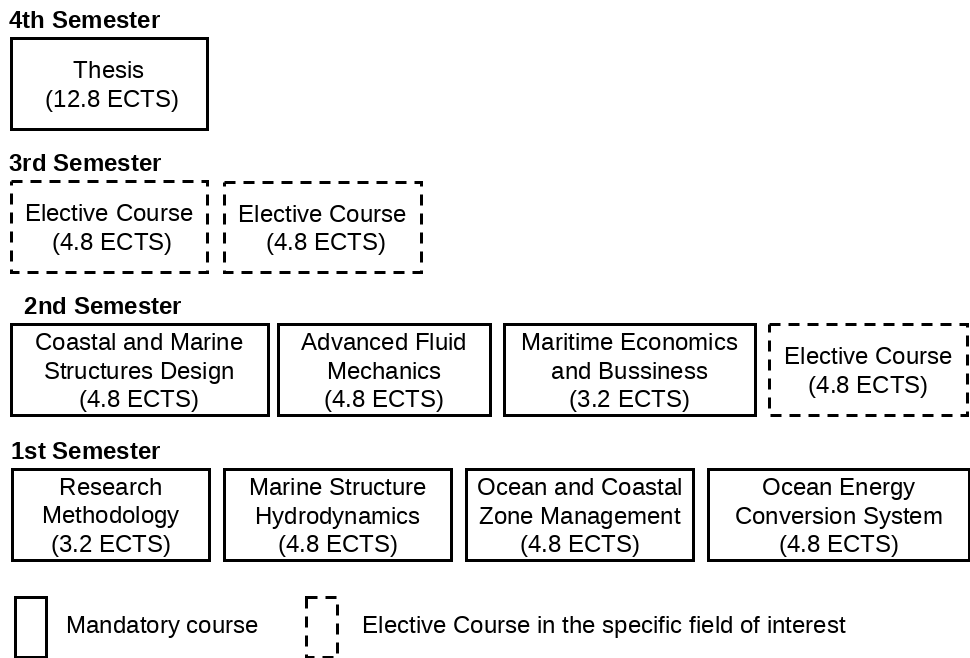In order to support national development which is oriented towards the development of ocean engineering, resources in this field are needed with sufficient quantity and quality. This is because sustainable development for Indonesia will depend on the success of Indonesia in developing ocean resources. Based on the desire to play an active role in the program to improve the quality of human resources in marine technology, since 1992, the Faculty of Marine Technology ITS pioneered collaboration with The Department of Marine Technology, The University of Newcastle Upon Tyne in pioneering graduate programs in marine technology .
The Department of Ocean Engineering, which is under the auspices of the Faculty of Marine Technology (FTK), opened the Graduate Study Program in Marine Technology starting in the 1996/1997 academic year. From the 1993/1994 academic year to the 2004/2005 school year, 118 graduates had graduated from 555 students. Starting in the 2001/2002 school year the Doctor of Marine Technology program was opened.
Supported by teaching staff with qualifications: 5 professors, 16 doctors. Supporting facilities available are as follows: Lecture Room, 6 Laboratories, Reading Room with more than 6000 library materials, 18 international scientific journals, Internet connections and other facilities.
Masters Program in Ocean Engineering implemented within four semesters (two years). The total credit load is 75 credits (equal to 120 ECTS), consisting of mandatory subjects and elective courses (36 credits), publication, research and thesis writing (39 credits) in accordance with the curriculum. These additional activities are mandatory in order to complete the academic activities and graduate from the program. The complete information regarding academic activities credits can be seen in table of the conversion of academic activities credit into ECTS. The Program Education Objectives (PEO) and Learning Outcomes (LOs) of MOE are as follows.
Program Education Objectives (PEO)
The objectives of the Master Degree in Ocean Engineering (MOE) Program is :
- PEO1: Graduates who are able to design onshore and offshore structures based on engineering principles by considering standards, codes, rules, regulations and recommended practices.
- PEO2: Graduates who are able to work independently and actively in a team for construction, inspection, maintenance, and repair works on onshore and offshore structures.
- PEO3: Graduates who are able to adapt in a cross-cultural environment by maintaining ethical and moral principles
- PEO4: Graduates who are able to hold academic ethic, think scientifically and have a willingness to learn continuously.
| Learning Outcomes (LOs) | ||
| Attitude Values | LO1 | Able to show the moral, ethical, responsibility and good personality in completing their duties |
| LO2 | Able to bring the spirit of independence and teamwork in completing their duties | |
| Managerial Skills | LO3 | Able to propose complex designs and analyze them using logical thinking by considering standards, codes, rules, regulations and recommended practices |
| LO4 | Able to develop leadership attitudes, creativity, and communication skills in solving ocean engineering related problems | |
| Mastered Knowledge | LO5 | Able to carry out scientific and technological development in ocean engineering through independent research |
| LO6 | Able to formulate new research questions to accomodate multidisciplinary knowledge for technology development in the field of design and construction of marine structures | |
| LO7 | Able to conceptualize, construct, and implement the research idea to yield the new and cutting edge knowledge and technologies in ocean engineering | |
| Working Capacities | LO8 | Able to identify, formulize and solved the science and technology problems related to ocean engineering through the accurate and innovative theoretical, experimental or computational approach |
| LO9 | Able to implement the principles of sustainability and lifelong learning in the knowledge development process. | |
Subject to the master degree in the Department of Ocean Engineering covers both basic courses and courses that focus on areas of expertise.
The structure of MOE curriculum consist of three selected fields of ocean engineering, which is
- Offshore Structure Design and Engineering,
- Coastal Engineering and Management, and
- Ocean Energy Engineering and Management.
MOE Curriculum in General

The conversion of academic activities credit into ECTS
| Curriculum of MOE | ||||
| No. | Course | Credits | ECTS | |
| 1 | Research Methodology | 2 | 3.2 | |
| 2 | Marine Structure Hydrodynamics | 3 | 4.8 | |
| 3 | Ocean and Coastal Zone Management | 3 | 4.8 | |
| 4 | Ocean Energy Conversion System | 3 | 4.8 | |
| 5 | Coastal and Marine Structures Design | 3 | 4.8 | |
| 6 | Advanced Fluid Mechanics | 3 | 4.8 | |
| 7 | Maritime Economics and Business | 2 | 3.2 | |
| 8 | Elective Courses | 9 | 14.4 | |
| 9 | Thesis | 8 | 12.8 | |
| Credit Total | 36 | 57.6 | ||
| Additional Activities | ||||
| No | Course | Credits | ECTS | |
| 1 | Attached to the Thesis | |||
| Publication | 8 | 12.8 | ||
| Thesis support works | 6 | 9.6 | ||
| 2 | Attached to the Research Proposal (Pre-Thesis) | |||
| Literature Review | 3 | 4.8 | ||
| Thesis Proposal | 2 | 3.2 | ||
| 3 | Additional activity in compulsory and elective courses (2 credits x 9) | 18 | 28.8 | |
| 4 | Language requirement: TOEFL | 2 | 3.2 | |
| Total additional activities credit | 39 | 62.4 | ||
| Total ECTS | 120 | |||
Course's Modules
| No. | Course ID | Course Name | Credits |
|---|---|---|---|
| I. Offshore Structure Design and Engineering | |||
| 1 | MO18-5204 | Structural Response Analysis | 3 |
| 2 | MO18-5205 | Operation Research Models | 3 |
| 3 | MO18-5206 | Experimental Design and Data Analysis | 3 |
| 4 | MO18-5207 | Computational Fluid Dynamics | 3 |
| 5 | MO18-5208 | Risk Based Design | 3 |
| 6 | MO18-5209 | Safety and Reliability of Marine System | 3 |
| 7 | MO18-5301 | Fluid-Structure Interaction | 3 |
| 8 | MO18-5302 | Advanced Fatigue & Fracture Mechanics | 3 |
| 9 | MO18-5303 | Tubular Joint Design | 3 |
| 10 | MO18-5304 | Design Optimization Techniques | 3 |
| II. Coastal Engineering and Management | |||
| 1 | MO18-5305 | Environmental Reclamation | 3 |
| 2 | MO18-5306 | Geographic Information System and Remote Sensing | 3 |
| 3 | MO18-5307 | Coastal & Marine Pollution | 3 |
| 4 | MO18-5308 | Mechanics of Sediment Transports | 3 |
| III. Ocean Energy Engineering and Management | |||
| 1 | MO18-5309 | Supporting Structure of Ocean Energy Conversion System | 3 |
| 2 | MO18-5310 | Ocean Energy Potential Assessment | 3 |
| 3 | MO18-5311 | Mechanics & Electrical System for Ocean Energy Conversion | 3 |
| 4 | MO18-5312 | Operation and Maintenance Management | 3 |

